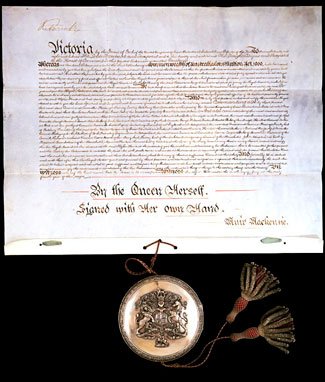On this day: The birth of the Australian nation

WHEN QUEEN VICTORIA SIGNED the Australian Constitution Act on 9 July 1900, our nation was legally born – but few Australians would be familiar with the date. So how could such a momentous occasion have fallen into relative obscurity?
One reason is that the Australian Constitution – the ‘supreme law’ under which our government operates – didn’t truly come into force until 1 January 1901. On this date, the Federation of Australia, six separate British colonies publicly united as one nation, which most people recognise as Australia’s ‘official’ birth.
But perhaps there is another reason why our Constitution’s history is not widely known.
The Australian Constitution
Take a moment to compare the formation of the Australian Constitution with that of, say, the United States of America. The latter was created in the years following the American War of Independence, and even today evokes images of violence, bloodshed, and national heroes fighting for liberation.
“If you kick off a process with a war that is really dramatic, you have a much more colourful and symbolically charged way of understanding your own constitutional history,” says Professor Helen Irving, an expert on Australia’s Constitution, from the University of Sydney.
In contrast to the US, the creation of our Constitution was surrounded by little turmoil – for one very good reason. It was the second time in any country’s history (Switzerland being the first) that the people had the right to vote on their nation’s Constitution. Even today, it can only be changed if the public agrees to it through a referendum.
Australia’s peaceful conception is something to take pride in, but compared to that of other nations, it seems to have been somewhat lost in the public consciousness. In fact, Federation Day, and the signing of our Constitution, has never been celebrated as a public holiday.
“I think it’s a shame many Australians don’t understand that it’s much better for a country to begin with a democratic, peaceful process,” says Helen. “It’s actually a great token of Australia’s institution-building capacity that we were able to do that.”
Blueprint for history of Australia
Nonetheless, Australians certainly do have a constitution to take pride in. It is undoubtedly the most important document in Australia’s history, controlling some of the most fundamental aspects of our everyday lives.
It gives us the right to vote, allows us to follow any religion we choose, and entitles us to trial by jury. It obliges all Australians to obey the law and provides the blueprint for the division of power between the federal and state governments.
Prior to Australia’s Federation, the only colonies in which women were permitted to vote were SA and WA. But the formation of the Commonwealth quickly led to the Franchise Act of 1902, which extended women’s voting rights across all states. Thus Australia, together with New Zealand, truly led the world in women’s suffrage.
One of the reasons for this, says Helen, was that Australia and New Zealand were very young nations, less embedded in a conservative culture. “They were really leading the world in terms of democratic developments,” she says. “There were very robust movements and very highly motivated women’s suffrage organisations. They worked assiduously lobbying the parliaments for changes in the law to allow women to vote.”
Constitution under scrutiny
For all its good qualities, though, our Constitution is not without its flaws. Recently it has come under fire from Sydney’s Aboriginal Advisory Council for neglecting to acknowledge the impact of colonisation on indigenous Australians.
Specifically, the Council is advocating for the words ‘European arrival’ to be changed to ‘European invasion’. Prime Minister Julia Gillard has promised a referendum, possibly at the next election, to better recognise indigenous Australians in the Constitution.
We don’t officially celebrate its creation, but we could do well to acknowledge our Constitution once in a while. It is, after all, what entitles us to many of the freedoms that define Australian life.
RELATED STORIES

